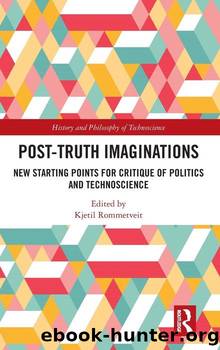Post-Truth Imaginations by Kjetil Rommetveit

Author:Kjetil Rommetveit [Rommetveit, Kjetil]
Language: eng
Format: epub
ISBN: 9780367146818
Barnesnoble:
Publisher: Taylor & Francis
Published: 2021-11-30T00:00:00+00:00
Notes
For one such example where Lynch reprimands a rather modest proposal to use description in the service of social critique, see: (Bogen et al., 1990). For a reply to Lynch, see: (Pels, 1996b). For a more general critique of Lynchâs stance, see: (Lynch and Fuhrman, 1992).
For a debate between Steve Fuller and Naomi Oreskes on this issue, see: (Oreskes and Baker, 2017). On the reception of Naomi Oreskes and Erik Conway within the STS community, see: (Radin, 2019).
John Law, for instance, writes: â[â¦] âactor - networksâ can be seen as scaled - down versions of Michel Foucaultâs discourses or epistemesâ (Law, 2008). The Clausewitzean dictum in science studies of treating science as if it was nothing but politics is commonly traced back to the Nietzschean-Foucauldian genealogy of power/knowledge. (Pels, 1995).
This argument harks back to Alvin Gouldnerâs perceptive critique of the âunderdog metaphysicsâ of the Chicago school sociologist Howard Becker (Gouldner, 1968). The applicability of his critique to large sways of the STS field has been noticed before (Fuller, 1993). That being said, underdog metaphysics has spread far and wide in the social sciences.
The polemic by Foucault against the (Soviet-loyal) party intellectual, was spurred on by a tide of Maoist populism (Khilnani, 1993). Accordingly, the Maoist method of doing factory worker â and prison inmate â inquiries can arguably be described as an avant-la-lettre follow-the-actor-approach.
A very long list of quotations could be marshalled to back this statement up. One will have to suffice: âThe notion of ideology appears to me to be difficult to make use of [â¦] Now I believe that the problem does not consist in drawing the line between that in a discourse which falls under the category of scientificity or truth, and that which comes under some other category, but in seeing historically how effects of truth are produced within discourses which in themselves are neither true nor false. [â¦] I think that this is a notion that cannot be used without circumspectionâ (Foucualt, 1980,p. 118).
To get an idea of what kind of ârisksâ that Steve Fuller is alluding to, as he, prudently enough, refrain from spelling them out directly, we may refer to Arlie Hochschildâs ethnographic study of how life is coped with in the âcancer beltâ of the US (Hochschild, 2016).
Quoted in: Luc Ferry and Alan Renaut (1990) âPreface to English Editionâ French Philosophy of the Sixties: An Essay on Anti-humanism. Amherst: University of Massachusetts Press, p. xiii.
Download
This site does not store any files on its server. We only index and link to content provided by other sites. Please contact the content providers to delete copyright contents if any and email us, we'll remove relevant links or contents immediately.
Enlightenment Now: The Case for Reason, Science, Humanism, and Progress by Steven Pinker(7307)
A Journey Through Charms and Defence Against the Dark Arts (Harry Potter: A Journey Through…) by Pottermore Publishing(4811)
The Immortal Life of Henrietta Lacks by Rebecca Skloot(4581)
A Journey Through Divination and Astronomy by Publishing Pottermore(4382)
Elon Musk by Ashlee Vance(4122)
Origin Story: A Big History of Everything by David Christian(3689)
COSMOS by Carl Sagan(3618)
Alchemy and Alchemists by C. J. S. Thompson(3516)
Bad Pharma by Ben Goldacre(3422)
Enlightenment Now by Steven Pinker(3367)
Shadow of Night by Deborah Harkness(3361)
Inferior by Angela Saini(3311)
A Mind For Numbers: How to Excel at Math and Science (Even If You Flunked Algebra) by Barbara Oakley(3302)
Origin Story by David Christian(3195)
The Code Book by Simon Singh(3184)
Signature in the Cell: DNA and the Evidence for Intelligent Design by Stephen C. Meyer(3132)
The Elements by Theodore Gray(3052)
A Brief History of Time by Stephen Hawking(3022)
A Journey Through Potions and Herbology (A Journey Through…) by Pottermore Publishing(2852)
